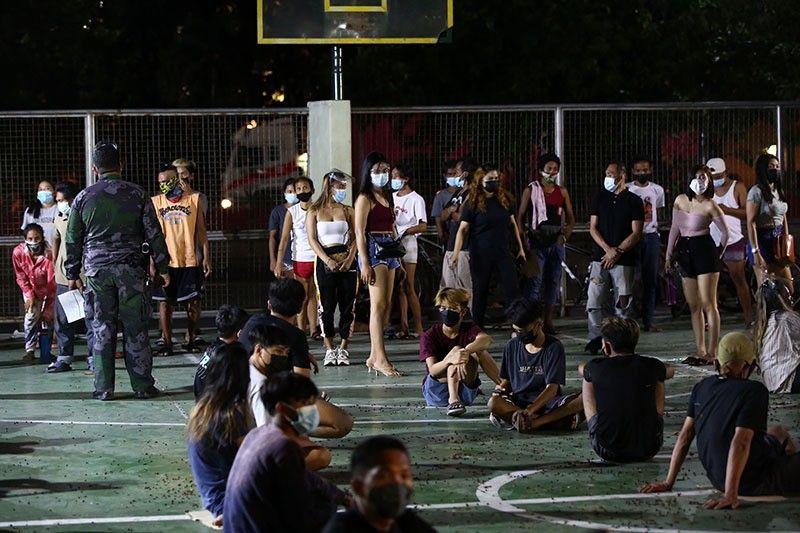DILG: Barangays to restrict unvaccinated 'within bounds of the law'

MANILA, Philippines — The Department of the Interior and Local Government assured the public that any barangay officials implementing President Rodrigo Duterte's directive to restrict the movement of unvaccinated individuals in their respective barangays will do so within the bounds of the law.
The Commission on Human Rights has cautioned against arrests of unvaccinated people since there is no law making being unvaccinated a crime or making vaccination mandatory.
“The president is merely exercising his authority as chief executive under the public health emergency. He was very clear in his directive that an arrest will only be a last resort. They will first appeal (with the unvaccinated) to stay in their homes," Interior Secretary Eduardo Año said in a statement sent to media on Monday.
"Barangay officials may only arrest the unvaccinated individual who refuses to cooperate and who are leaving the homes for non-essential purposes."
He advised the public to bring their vaccination cards at all times to present to barangay officials and to police officers as proof of vaccination upon request.
DILG: Barangay officials must be guided by local ordinances
Año said that barangay officials are persons in authority and are duty-bound to implement the president’s directive as well as the ordinances passed by their respective local government units.
"I am now giving orders to the barangay captains to look for those persons who are not vaccinated and just request them or order them if you may to stay put," Duterte said during his "Talk to the People" pre-recorded message aired last Thursday.
As he has in the past, the president went on to threaten arrest against anyone refusing vaccination. "If he refuses, if he goes out his house and goes around the community, he can be restrained. If he refuses, the captain is empowered now to arrest recalcitrant persons," he said.
Rights group Karapatan said that while the government can be imposed during public health emergencies, these should be proportional and non-discriminatory.
"Prohibiting access to basic services such as public transportation and threats of possible arrests and detention of unvaccinated individuals if they go out of their homes are certainly highly questionable policies that violate their rights," Karapatan Secretary General Cristina Palabay said last week.
DILG Spokesperson Jonathan Malaya in the department's statement Monday said that barangay officials should also be guided by the ordinances passed by their LGUs.
RELATED: LGUs have leeway in enforcing quarantine, but no license for cruel punishments
As of this writing, seven local governments in Metro Manila have so far approved ordinances restricting the mobility of the unvaccinated in their respective jurisdictions. These are:
- Caloocan City (Ordinance No. 0959)
- Quezon City (Ordinance No. 3076)
- San Juan City (Ordinance No. 2022-1)
- Valenzuela City (Ordinance No. 976)
- Pateros City (Ordinance No. 2022-01)
- Las Piñas City (Ordinance 02-2022)
- Taguig City (Ordinance No. 62)
Other city governments in the capital region remain in the process of deliberating their respective ordinances which should pass next week.
Unvaccinated required to present negative RT-PCR tests
This comes after all Metro Manila mayors earlier passed a Metro Manila Council resolution that unvaccinated and partially vaccinated individuals must remain in their homes except for essential trips under Alert Level 3 or higher.
In areas with effective ordinances, the DILG said that the unvaccinated need to stay at home except to procure essential goods and services such as food, water, medicine or medical devices, public utilities, work, and medical and dental visits.
Under the resolution by the Metro Manila Council, the unvaccinated will also be banned from indoor and al fresco dining, hotels, country clubs, leisure trips, and similar establishments and public transportation.
Malaya said that unvaccinated individuals going to work must present a negative RT-PCR test result every two weeks otherwise they will not be allowed to leave their homes.
"We are doing this to protect the unvaccinated themselves because they are prone to critical illness and hospitalization and we need to protect our health care system from being overwhelmed with the exponential rise of coronavirus cases because of the Omicron variant," he said.
The ordinances, which outline administrative penalties ranging from P500 to P5,000 with imprisonment of 7 days to 30 days, authorize barangays officials, the police, the City Health Office, and the Business Permits and Licensing Office to implement the law.
Establishments that violate the ordinance will also be penalized with a fine of P3,000-5,000 and suspension or cancellation of business permits at the discretion of the court.
- Latest
- Trending


































